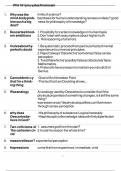Phil 101 jmu yates final exam ,e ,e ,e ,e ,e
1. Why was the limits of science?
,e ,e ,e ,e
mind-bodyprob- best basis for human understanding:senses or ideas? good
,e ,e ,e ,e ,e ,e ,e ,e ,e ,e
lem such a big
,e news for philosophy of knowledge?
,e ,e ,e ,e ,e ,e ,e ,e
deal?
,e
2. Descartes3mod- 1. Possibility for certain knowledge on human basis ,e ,e ,e ,e ,e ,e ,e ,e
ern ambitions
,e ,e2. Don't start with assumptions about higher truth ,e ,e ,e ,e ,e ,e
3. Rid reasoning of all errors ,e ,e ,e ,e
3. 4rulesabouthy-
,e ,e ,e 1. Be systematic:proceed from particular facts of mental
,e ,e ,e ,e ,e ,e ,e
perbolic doubt
,e ,e experience to universal principles.
,e ,e ,e ,e
2. Reject 'always' that which is 'sometimes' false:sense ,e ,e ,e ,e ,e ,e ,e
perception.
,e
3. Treat that which is'possibly' false as 'absolutely' false:
,e ,e ,e ,e ,e ,e ,e ,e
Mathematics.
,e
4. Pretend to have a reason to maintain your doubt:Evil ,e ,e ,e ,e ,e ,e ,e ,e ,e
Genius.
,e
4. Cannotdent==y ,e ,e -Goal of Archimedean Point ,e ,e ,e
that I'm a think-
,e ,e ,e ,e -The fact that I am Doubting shows...
,e ,e ,e ,e ,e ,e
ing thing
,e ,e
5. Wax analogy ,e An analogy used by Descartes to consider that if the
,e ,e ,e ,e ,e ,e ,e ,e ,e
physical properties of something changes, is it still the same ,e ,e ,e ,e ,e ,e ,e ,e ,e
thing?
,e
wax essence can't be physical qualities;can't be known
,e ,e ,e ,e ,e ,e ,e ,e
through sense-perception
,e ,e
6. why does ,e -His philosophy of substance:Logical necessity
,e ,e ,e ,e ,e
Descartesbe-
,e ,e -Hisphilosophyofknowledge:ideasofinfinity&perfection
,e ,e ,e ,e ,e ,e ,e ,e
lieve in God?
,e ,e ,e
7. Two criticisms of 1. assumes god from the start?
,e ,e ,e ,e ,e ,e
'the cartesian cir- 2.trusts his reason the whole time?
,e ,e ,e ,e ,e ,e ,e ,e
cle'
,e
8. reasonrelieson? experiential perception ,e ,e ,e ,e
9. Impressions come first from experience, immediate, vivid
,e ,e ,e ,e ,e
1/6 ,e ,e
, Phil 101 jmu yates final exam
,e ,e ,e ,e ,e
10. Ideas come second from impressions, indirect and less vivid,
,e ,e ,e ,e ,e ,e ,e
combinations
,e
11. simple ideas ,e copies of sense impressions ,e ,e ,e
12. complex ideas ,e combination of simple ideas ,e ,e ,e
13. twocategoriesof 1. relations of ideas
,e ,e ,e ,e
knowledge
,e 2. matters of fact ,e ,e
14. howcauseand,e ,e the idea of cause and effect goes in the category of mat- ters
,e ,e ,e ,e ,e ,e ,e ,e ,e ,e ,e ,e
effect is really
,e ,e ,e of facts
,e ,e
not a law
,e ,e ,e
15. Skepticism A philosophy which suggests that nothing can ever be
,e ,e ,e ,e ,e ,e ,e ,e
known for certain. ,e ,e
16. possible criti- ,e 1. he's very certain about his critique of certainty
,e ,e ,e ,e ,e ,e ,e
cismsofHume
,e ,e ,e 2.isn'theusingcauseandeffectrespondingtochallenges
,e ,e ,e ,e ,e ,e ,e ,e
age the cause and effect law
,e ,e ,e ,e ,e ,e
3. if you allow a priori-ish relations of ideas, why not allow for
,e ,e ,e ,e ,e ,e ,e ,e ,e ,e ,e
cartesian innate ideas?
,e ,e ,e
17. Three summary 1. No clear and distinct ideas
,e ,e ,e ,e ,e
critiquesofratio- 2. No certainty about our inferences
,e ,e ,e ,e ,e ,e ,e
nalism
,e 3. Psychology of drawing connections from Impressions ,e ,e ,e ,e ,e
,e means no knowable rational laws of truth ,e ,e ,e ,e ,e ,e
18. Friedrich Niet- ,e "On truth and lying in a non-moral sense"
,e ,e ,e ,e ,e ,e ,e
zscheRebellion
,e ,e
19. Nietzcheasa ,e ,e focuses on our formulation of concepts and the ,e ,e ,e ,e ,e ,e ,e
iconoclast
,e truth-claims that goes with them.
,e ,e ,e ,e ,e
aims to denounce, then possibly recover something.
,e ,e ,e ,e ,e ,e
20. key themes:
,e intellectualpretense and drive-to-truth.We obligate our- ,e ,e ,e ,e ,e ,e
FriedrichNiet-
,e ,e selves
,e
zsches
,e concepts as path of abstraction ,e ,e ,e ,e
Conceptsrootedinmetaphors:Reason-languageconnec- ,e ,e ,e ,e ,e
2/6 ,e ,e




